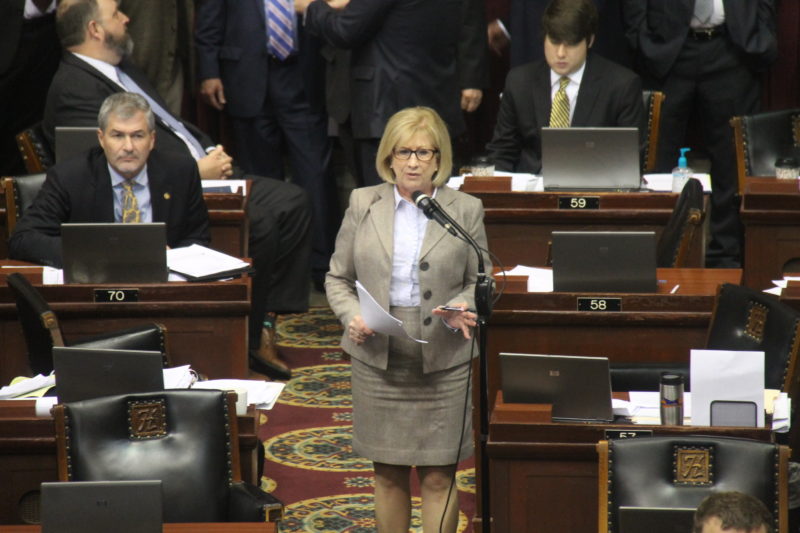JEFFERSON CITY, Mo. – Missouri’s effort to protect the state’s law enforcement officers is one step closer to reaching fruition. The Missouri House took up a number of bills for perfection Tuesday morning, with the first bill being perhaps the most contentious one.
Rep. Marsha Haefner’s bill, HB 57, began as an attempt to include law enforcement and first responders as a protected group under the current hate crime statutes. Haefner, R-St. Louis, urged the House to vote in favor of the bill, saying that state statutes already include law enforcement officers under the list of protected groups.
“This bill adds additional crimes with enhanced penalties for law enforcement officers,” she said. “It is intended to show meaningful support for our officers across the state, and to express the level of intolerance Missourians have for those who commit crimes against the very people who have taken an oath to protect and serve us.”
While the majority of the members the chamber seemed to agree that the protection of law enforcement officers was necessary, the real debate came over the amendments proposed to change the bill.
Rep. Nick Marshall’s amendment sought to take out the “special victim” part of the language and replace it with “law enforcement officer.”
“Nothing against any of these groups, but the purpose of this legislation was to have the back of our law enforcement officers, of our men and women in blue, and to set them apart as we used to do,” he said. “So, in these different areas, this amendment would change it from applying to “Larry the Cable Guy” to law enforcement.”
But several members expressed concerns that the amendment’s language removes the provisions for firefighters and first responders, asking if the men and women of fire and emergency were not as likely to be attacked as an officer.
The debate took a turn after an hour when the discussion turned to capital punishment.
Rep. T.J. Berry, R-Clay County, proposed an amendment, rising to say that one of the issues that needed to be discussed was the death penalty. His amendment sought to remove any death penalty language from the bill.
“From an objective point of view, I don’t think there’s a way that we can defend it anymore,” he said.
He noted that there’s no going back if a convicted suspect is later exonerated because the penalty has already been carried. He also said that it’s easily more cost effective to incarcerate a convict for life than to execute.
That led to an emotional testimony from House Minority Leader Gail McCann Beatty, who told the House about how she had lost a brother and two nephews to murder, and that at no point did she ever wish for the death penalty to be used.
“I don’t see the point in making that family suffer. They shared the pain that I did,” she said, choking back tears. “There is no point, it doesn’t bring them back. All victims don’t want this.”
Rep. Kevin Engler acknowledged the discussion for the death penalty, saying it was needed, but that it would not have any effect on the proposed bill before the House.
“This hits us all,” Engler said. “We know this will not get through the Senate and will not get signed. So I hope this was just to start the discussion because it has to happen.”
In the end, the bill was perfected with only Marshall’s amendment attached.
The next bill to appear before the House concerned HB 302 & 228, sponsored by Rep. Justin Hill, R-Lake St. Louis, which would establish the Blue Alert system promised by Gov. Eric Greitens.
Several amendments were proposed to address perceived issues with the bill, including two from freshmen legislators Reps. Bruce Franks and Peter Merideth.
Meredith’s proposed changes would have asked for an advisory to be placed in the language of the bill, reminding people not to attempt to track or apprehend the suspects in an issued Blue Alert.
Though the Blue Alert is similar to the Amber Alert system, Merideth noted that this would be the first time such an alert was used to hunt down a suspect.
He cautioned that creating the Blue Alert could potentially put suspects in danger as well if people chose to take justice into their own hands.
That measure failed, while his colleague, Rep. Franks, saw his amendment pass.
Franks’ proposed change added to the language, creating an exception that would upgrade the class A misdemeanor charge for false reports to a Class E felony if it leads to serious injury or death.
Both bills now await a third reading in the House.
Benjamin Peters was a reporter for The Missouri Times and Missouri Times Magazine and also produced the #MoLeg Podcast. He joined The Missouri Times in 2016 after working as a sports editor and TV news producer in mid-Missouri. Benjamin is a graduate of Missouri State University in Springfield.














